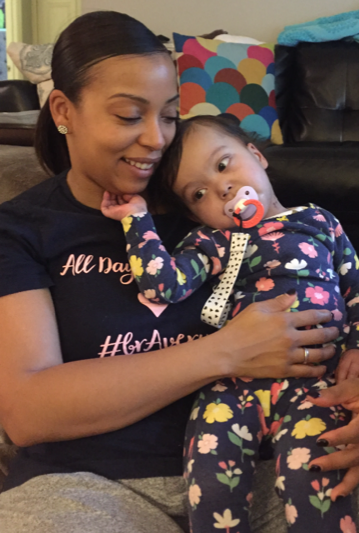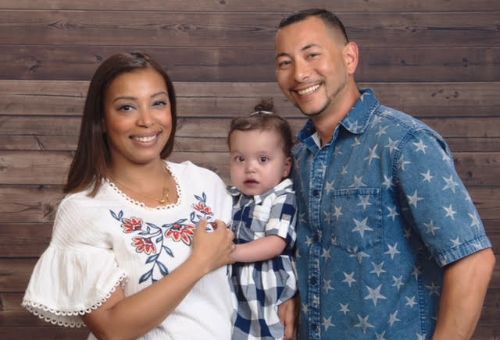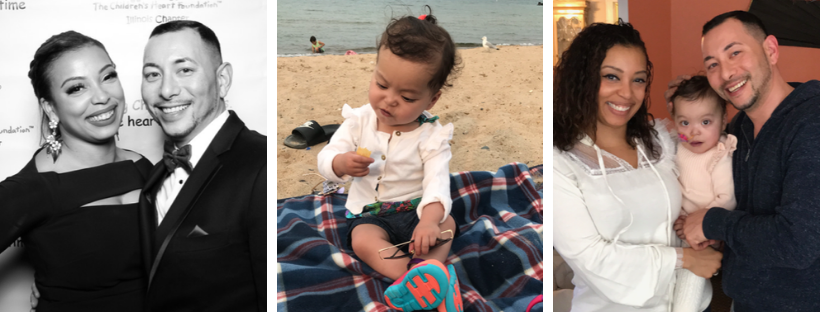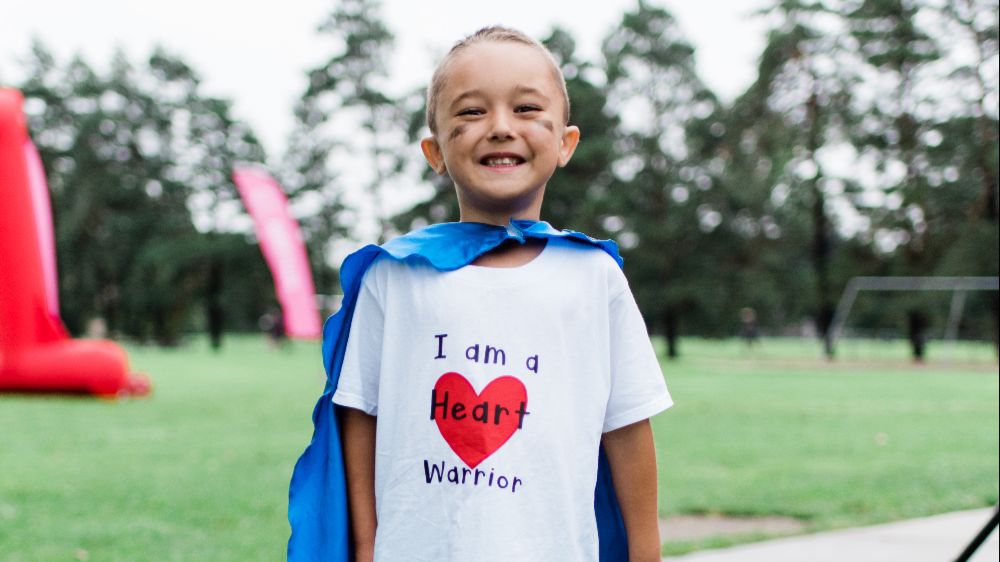When Things Don't Go As Expected: A Glimpse Into the Life of a Family Living With CHD
By: Tawanna Nishibayashi

There are things that you can prepare for in life. I am a firm believer that preparation helps to set you up for success. It helps to achieve a desired outcome. Preparation also helps to give you the illusion of control. Over the past few years life has taught me that often, you make plans and God laughs. The events over the past few years have reiterated a lesson that I thought I had learned long ago; sometimes there are things that you cannot prepare for. Preparation is still a key part of how I function, but I now fully understand that there are some instances where preparation simply lays a firm foundation for you to land on when the messiness of life happens in between your plans (as it inevitably does.)
We got married. We decided to try for a baby. We began to prepare our minds, bodies and home. We planned and executed. Preparation mode was in full effect. I have told our daughter Avery Grace from the moment I knew she lived inside of me that we wished for her, hoped for her, prayed for her and planned for her. Once we knew she was on her way we prepared for her in every way possible. Avery Grace, you see, is our absolute biggest and best blessing.
One can prepare to be a parent in a myriad of ways, doing all of the things that expectant parents do. You can take the vitamins, eat the foods that are recommended and stay away from the ones that you are told to avoid. You can get the rest, talk and sing to your baby in utero, read all of the parenting books, ask all of the questions of those you trust and love, receive countless advice from the multiple individuals who feel the desire to offer it, take the lamaze classes, purchase the items, create a nursery, have a baby shower, create the birth plan and so on. Have I exhausted you yet? Just think, this is before things went a “little” to the left for us.
One never thinks or dwells on the idea that things may not go as expected. One doesn’t think or dwell on the fleeting fear and idea that their child may not be healthy. I believe that most individuals assume that they will have a healthy baby-ESPECIALLY when you are healthy, aware, careful, crossing your T’s and dotting your I’s and overall doing the “right” thing.
What you cannot prepare for is being at your anatomy scan that seems to be taking a little too long as the technician is replaced by a doctor, and then another one. They ask that you come back for an additional more thorough scan with a maternal fetal medicine doctor in two weeks. They assure you that everything is “fine” and that they simply want a closer look, but you’re already a mama in every way that counts and deep down you know that isn’t the case.
You cannot prepare for the next anatomy scan, where the only chair for your husband is across the room from you. As the doctor makes clearing sounds in his throat tears fill your eyes and you hold your hand out for your husband to come join you just as the doctor says “There is something wrong with your baby’s heart. We need you to come get an echo as soon as possible…”
You cannot prepare for the dread and horror as you internalize all the doctor told you on the short car ride home, or the fact that you have to wait 4 days before getting an official diagnosis. Though you are a grown woman of 35 you find yourself moaning a guttural moan as you slide into the car and wail “I need my mommy.” Your family is across the country, Illinois is not where you are from and is what you had always thought of as a temporary home or resting place. Your husband, clearly alarmed, calls your mother whose harried voice resonates through the car speakers. She picks up even though she is at work and it is busy as you wail and force out, “There is something wrong with Avery’s heart.”
How can you prepare for the waiting? Days that you are filled with the unknown. The maternal fetal medicine doctor had finally spit out the potential of hypoplastic left heart syndrome as you fired question after question while sitting on the exam table still fiercely gripping your husband’s hand. Even in your panic, your inquisitive mind, attention to detail and tenacity served you well. As the doc hemmed and hawed and said NOT to look it up, that he wasn’t sure,” really couldn’t say” and to wait until we had the echo 4 days later you begin to make a plan to do just that. When you get home and research you learn that HLHS literally means that your child will be born with half of a heart, that there are staged surgeries that only prove to prolong life, every “fix” is palliative in nature and causes other issues within the body along with the mortality rates. With current research, a heart transplant will always be the endgame. Of all of the congenital heart defects, if this is what Avery had we had just won the lotto backwards with one of the most rare and severe diagnosis’s. We prayed for anything but that.
This is how our journey starts.
You cannot prepare for the confirmation of HLHS days later, or being offered more than once to terminate your 21 week pregnancy with Avery growing and kicking inside of you. You cannot prepare for being offered palliative care or for a multitude of individuals trying to sway us to get an amniocentesis. They were all doing their due diligence as a part of making us aware of our options, but knowing that didn’t help much at the time. This is the beginning of our journey where I learned how much doctors are what I like to call “data heads.” The idea that we wouldn’t have an amniocentesis because of the risk that it posed to our already fragile baby and pregnancy barred them from the ability to prepare for potential pitfalls. My mother’s intuition told me that it was the right thing to do and that there was nothing else “wrong” with our baby. For us, that was the end of that.
There isn’t a precedent for life as you know it changing forever. Initially it happens in pieces, slowly breaking waves swishing in to wash away one thing at a time until unexpectedly the tsunami hits and you are left with nothing of your will and design. You find yourself looking at what’s left in terror and wondering how you will move forward. If you are me, you take the first step in faith, because that’s literally all you know to do.
There isn’t preparation for the birth plan and holistic birth that you created from your heart dying on the paper that you printed it on as you hand it over to your various team of doctors that you now see weekly. When you aren’t in a doctor’s office for yourself or Avery Grace you alternate between researching surgeon’s, hospitals, programs and outcomes as you attempt to determine the best place to bring into the world to give her a fighting shot at longevity and survival. Congenital heart defects are rarely cut and dried. There is your initial broad diagnosis that is generally followed by specific complications. In addition to hypoplastic left heart syndrome we knew early on that Avery had a small ascending aorta and tricuspid valve regurgitation-things that make an already complicated case more so.
They can tell you that you will not have the opportunity for skin to skin - that you will not be able to hold your daughter when she is born after you held her with everything that you had within you for 9 months. They can tell you that a team of doctors will have to be present when you deliver. That doesn’t prepare you for 17 medical professionals in the room as you make your last few pushes, and for not getting a glimpse of your daughter as she is literally pulled from you and brought to the doctors across the room to assess. A NICU attending kindly pushes her bed over to yours right before they wheel her away so that you see for 30 seconds what she looks like. Then poof.
You cannot prepare for the feeling that washes over you after you tell your husband to “Go with them! She cannot be alone” as you had discussed. The decision was always going to be for him to leave me to be with our girl. You know this, you stand behind it, yet it still feels surreal to have a room full of people and give birth to a child that they whisk away along with your emotional support and find yourself alone fearing for her life.
You most likely do not plan to deny most post op care so that you can be at your baby’s side- in a wheelchair, with an IV and a catheter, bleeding heavily 2 hours after giving birth at the hospital next door.
There truly isn’t a way to wrap your brain around sending your 5 day old newborn off for open heart surgery, as you take a picture of her unscarred chest in all it’s perfection. The only picture you will ever have of your baby before her zipper scar that has been opened again and again. The last time your child was relatively untouched. You are very newly postpartum and have barely held your newborn as you watch her roll away screaming with only nurses and doctors that you have just met as her companions.
You cannot prepare for learning to make peace with the scars from PICC lines, catheterizations and IV’s that mar your child’s beautiful strong body. There are always new visible, and invisible, scars to contend with.
How do you reconcile the bruise that you caused on your child that came from holding them down so that a doctor or nurse could place an IV, draw blood or get the pictures needed on an echo? The mental effect it has on you and your child, along with the potential jeopardy of the trust that they have in you is unchartered territory. You are their only constant protector and safe space who they know won’t come at them with the intention to hurt in some way.
Crippling anxiety...you cannot prepare for your child’s fear of strangers or unwillingness to walk outside or play with others in the park. There is screaming and abject terror that happens when you enter an exam room at the doctors office, the hospital or when your child sees rubber gloves. They now know that something painful generally happens after they see gloves. The smart deductive reasoning of a medically fragile 2 year old...
There is no guidebook for trying to explain the unexplainable and why the procedures are necessary to a child that doesn’t have the capacity to fully understand but that knows enough to know to be terrified.
ALL of this has effects. Some we know, others are waiting further down the road. To get to those effects means that Avery Grace is still here. We pray to get further down this road with all of our might. Really, it’s the only option in our world that we can wrap our brains around and make sense of.
There are things we knew, that provided us a modicum of comfort. We knew the program and hospital that we chose and the staged surgeries. We had planned our finances and our home as well as packed bags to create a full nursery in the hospital for Avery Grace along with bags with enough items to last a month for ourselves. We had a meal train and purchased food and gift cards and had done research on hospital living. There was never a question that Avery would be left alone. It was our mantra then, and it is our mantra now. If Avery is in the hospital so are we. All children need their parents present-medically fragile children more than most. We knew that we were (and are) her advocates. We were, and are, her voice. It is easy to get lost in the hospital, and there are many potential complications of Avery’s condition and hospital life in general. It is our job to mitigate what effects we can, and to protect her from any that may be unnecessary.
We knew that the average stay for a patient who had the first surgery (the Norwood) hovered around 3 ½ weeks. We knew the mortality rates for the time between the first and second surgery (interstage) and that we would be followed closely. We knew that after the second surgery (the Glenn) we were supposed to have a year and a half or two of relative normalcy prior to the 3rd and last planned surgery within the 3 stages (the Fontan.) While all hypoplasts have a heart transplant as the end game because the 3 staged surgeries are a palliative fix that stabilizes and buys time, we felt safe in the knowledge that this was something that was down the road for us. Until it wasn’t.
There are things like being the parent of a tube fed child with a 25% mortality rate and giving Lovenox injections twice daily as new parents and non clinician’s that added further required adjustments to the mix. Administering life saving and maintaining meds every 3 hours 24 hours daily was our reality upon our first hospital discharge. You learn that sleep is a thing of the past and that you will not have the ability to lose track of time or relax for years to come as you give medication and set up tube feeds at midnight, 3 am, 6 am and so on 24 hours a day. You cannot prepare for placing nasal gastric tubes and monitoring vitals, weight and more reflux and vomit than most people see in a lifetime. You cannot prepare for trying to teach a child what hunger is, how to chew and swallow and what eating is in general when they’ve never had that experience their first year of life. That was all just the tip of the iceberg. Things leveled up.
Avery Grace had complications during her Norwood stay that kept us inpatient for 6 weeks (blood clots,a potential medical NEC diagnosis, tube feed tolerance and resulting reflux and emesis to name a few.) Then, she had complications during interstage prior to the Glenn. Post Glenn, we had three months where we thought that Avery was fighting a cold during the dreaded cold and flu season. Despite our pediatrician’s assurance that she was ok, we determined that we wanted to be admitted to our hospital to get more eyes and support from our team. One learns quickly which things to bring to your cardiologist vs your general practitioner’s in regards to your extremely medically fragile child.
Within 24 hours of admission Avery’s health declined rapidly. What we thought was going to be a quick inpatient stay to do some medication titration and obtain support to help her over the theoretical cold turned into increased work of breathing, tachypneia, insanely fast heart rate (tachycardia), profuse sweating, becoming febrile, extreme edema and cyanosis. The heart failure team was scheduled to come into see us bright and early the morning of our second full day and the attending spent the night in or just outside of our room as we discussed intubation and putting Avery on a paralytic to give her body some rest and support and stabilize her enough to wait for a heart. In a matter of ONE day our world was turned upside down. We went from trying to get over what we thought was the common cold manifesting itself in a fragile body to preparing to shut Avery’s body down as much as possible and list her for a heart transplant at the tender age of 7 months.
There is no way to prepare for the very real reality that your daughter may not make it through the night.
There is no way to prepare for the realization that her tricuspid regurgitation has caused heart failure and several other organs injury. There is no way to prepare for the discussions, teams you meet and the decisions that follow.
There is no way to prepare for the failed tricuspid repair surgery that you were told for a week was a success only to find out on your discharge echo that it was not. Three open heart surgeries within the first 7 months of life is the “badge of honor” that is now bestowed upon your baby girl.
There were, and continue to be, so many decision’s placed before you that aren’t clear cut. Do you place a mechanical valve, place her on the list for a heart transplant or attempt to medically manage her heart failure with medication? The decision gets murkier and your view more cloudy as you seek second, third and fourth opinions with the help of your wonderful team and each comes back with a different answer. All decisions come back to you without a clear winner in sight.

What is the right decision that will help to save and prolong your child’s life?
In the midst of this Avery had 3 failed PICC lines and a wound infection that threatened her life in addition to the failed surgery and heart failure. We had to open her up multiple times. We ultimately got discharged with a PICC line and IV antibiotics once we were finally able to get Avery’s heart failure medically managed. This was the most tumultuous time in her life to date.
We had over a year at home with Avery before things began to go sideways again. I knew in my heart that her baseline had changed as Avery began to exhibit lower oxygen saturations among other signs that were almost imperceptible to the untrained eye. However, over the past two years I have very rarely left Avery’s side. I know my girl. If something is off, I notice it right away.
Then came a cold that she couldn’t recover from. I requested some testing to be moved up which confirmed that her heart failure had worsened. After a few other steps and several insurance fights Avery Grace is now listed outpatient for a heart transplant at 2 ½ years old. The third staged surgery, the Fontan, is not in the cards for us. We flew right by and bypassed the mythical time that they tell you comes after the Glenn and before the Fontan surgeries. A relative two year utopia where you mostly get to be done with hospitals and try to live a “normal” life and attempt to provide some levity and traditional childhood experiences for your child. Instead, we got stuck in quicksand that keeps threatening to drag us further down at each turn. Our prayer is that Avery will receive a heart while outpatient, though the chances are slim, and that we can keep her stable until that point. As mentioned above, Avery has horrible anxiety associated with the hospital and has an approximate 9-10 month developmental delay as a result of her surgeries, hospital stays and experiences. She currently lacks the ability to understand what she is going through, and why. Sadly, the more realistic scenario is that her health will decompensate and we will end up inpatient and get bumped up on the heart transplant list.
I want to be really clear about this next point: A transplant is not a cure, it’s simply another palliative fix.
We are exchanging one set of issues for another. The fear of rejecting the donor heart looms large, as does many other potential complications from the immunosuppressant medications that will be required to maintain her life. We choose to believe in miracles and unicorns, and that we can help Avery beat those odds and receive the perfect donor heart for her that will have zero rejection while we are outpatient.
How do you function in a world where you know that your child’s life will most likely end before yours?
How do you live with that reality daily and still find joy?
How do you deal with seeing your child ill way more than not along with the reality that negative touch, hard blood draws, forceful echo’s, being tethered to machines, and having their space invaded and free will violated is their reality?
All is necessary to save their life, but where is the innocence in childhood or freedom of fun and play in any of that?
How do you manage the consequences of that life; developmental delays, anxiety, psychological effects and outbursts?
How do you handle the restrictions of living in a bubble with little to no outside contact for months on end because your child is immune compromised, medically fragile and cannot handle the common cold?
What do you do when even going to the grocery store with your child in tow isn’t a possibility for 6-8 months out of the year?
What do you do when you are isolated from family and friends because you are now bound to your child’s health, schedule and routine? Family holidays filled with a ton of people are no longer an option. You celebrate everything with your little family of three.
How do you present normalcy and foster growth when a child is largely house bound?
How do you function when your drive and passion for your career must now disappear because you have to be a stay at home parent for the best interest of your child? It’s not what you envisioned for yourself, but you learn to be grateful for the opportunity because you can care for your girl as no one else can. You know her the best. Since day one it has felt as if you share the same soul. It is your joy, privilege and honor to take care of her and be with her all day every day. In a way that is more real to you than it is to most-your time together isn’t promised.
You will not have any regrets and you will know that SHE knew that she could count on you always. You are able to witness and be a part of every moment and spot every change from her baseline in order to address it. You fight insurance, ask questions of doctors, make demands, say no and nurse her back to health more times than you can count. You are there before every surgery and procedure and always when she wakes up. You are there overnight and every moment in between. She becomes your purpose.
You are grateful.
There is love.
There is joy.
There is fear.
There is anxiety.
Underneath it all you long to find out who you are again and miss having a career that is meaningful and filled with a purpose outside of the home. You miss having something that is uniquely yours. However, if you have learned anything it is be IN your moments and EMBRACE the season you are in. You try to remember to breathe. This is life now, but not always. The alternative is one that you don’t want to think about, because one of the very real other options means that Avery Grace is no longer with us.
Who can prepare for THAT? No one. There simply isn’t a way.
Relationships shift and change, those who were close to you before sometimes drift away because they don’t know how to relate or can’t handle your new reality. There is no guidebook for this. Sometimes people drift simply because you are no longer able to be fully present for anything or anyone that isn’t your child until they reach a stable point. Even then you have a nagging sense of urgency because you’re waiting for the other shoe to drop. All fixes are palliative in nature, there will always be complications and new hurdles to face.
Those who you thought would be present for you often simply aren’t. Family is not exempt from this. There is no preparation for that.
There is no preparation for the grace and beauty that shows up when the unexpected individuals begin to show up in your life. There aren’t ways to describe the beauty and kinship that lies within the connections that you build with other heart families or families with other types of medically fragile children. Only they get that the potential complications from the surgery are often more treacherous than the surgery itself, what it's like to hand your child over to a person that will literally cut them open in an effort to save and prolong their life, how terrifying germs and the common cold can be, what it’s like to live in relative isolation and how it feels to have other relationships that were dear to you dissipate into thin air.
Only they get the frenetic way you sometimes catch yourself watching your child, the terror and PTSD that everyone inevitably gets from living this life and spending months on end in a hospital and the juxtaposition of joy that you learn to find in every moment that you are blessed to have. You cherish those moments and take picture after picture while your child hems and haws. You record reels of video and take in details of their growing hands and feet and the smell and feel of their hair. You try to burn into your brain the way their little hand fits into yours and how their touch feels. Again, tomorrow isn’t promised in a way that is more real for us than for most. We get what coping is like, what burnout is like and what passion and advocating hard are like.
You learn that there are things that you can do to affect the outcome for your child and the other children like her. You learn that there is a vast hole where diagnosis and research meet.
You learn that most aren’t aware of the plight of families and children that suffer from, and are affected by, congenital heart defects. You learn that you can help to fill the void of funding and awareness. You find purpose doing the work that means more to you than any work ever has in your life prior. You learn to become an advocate for children and families. It is the greatest gift you have ever been given next to the gift of your child, who some lovingly call Amazing Avery Grace as she defies odd after odd and persists.



